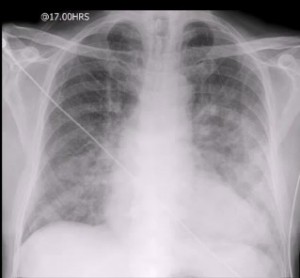The most common condition caused due to excess fluid in the lungs is called pulmonary edema. It results in the collection of fluids in the various sacs of the lungs leading to difficulties in breathing.
On most occasions, pulmonary edema is caused due to cardiac abnormalities. But the fluids can collect in the lungs for various other reasons such as certain medication, excessive exercising, pneumonia, exposure to toxins as well as living at high altitudes.
Even though pulmonary edema is fatal, it can be treated if detected early and if the underlying conditions are dealt with.

Symptoms of fluid in the lungs or pulmonary edema
The symptoms for pulmonary edema may vary depending on the respective cause and may appear suddenly or over a period of time. Some of the symptoms are discussed below:
For acute or sudden onset–
- Severe shortness of breath or problems in breathing that worsen when one lies down
- Rapid heartbeat or palpitations
- Sensations of drowning or suffocation
- A sense of uneasiness, anxiety and restlessness
- The cough may produce foamy sputum and may have some tinges of blood
- Gasping for air or wheezing
- Increased sweating
- In case, pulmonary edema is caused by heart conditions, then it may cause pain in the chest
- Increased paleness of the skin
- In case of the above symptoms, it is essential to contact medical help right away, else it may prove to be fatal.
For long-term onset–
- Wheezing
- When individuals are physically active, they may have increased shortness of breath than normal
- Sleep disturbances which may result in individuals waking up to sit, so as to relieve feelings of breathlessness
- Individuals may have problems with breathing when undergoing exertion which may be more pronounced while lying down than while in a seated position
- When the condition results from congestive cardiac failure, then it may lead to a build-up of fluids in the body, particularly the legs. This may eventually lead to rapid weight gain. In addition, the legs and ankles may swell up
- Increased tiredness or fatigue
- Loss of appetite
Symptoms caused due to high altitudes–
- Sleeplessness or insomnia
- Headache
- Cough
- Retention of fluids
- Shortness of breath
Some of the complications that may result from fluid in the lungs are listed below:
In prolonged cases of pulmonary edema, the pressure in the pulmonary artery may increase leading to the failure of the right ventricle. This is because the right ventricle is less required to pump blood into the lungs and therefore has a thinner wall of muscle than the left side. Such failure can lead to:
- Swelling if the legs as well as the abdomen
- Swelling and congestion of the liver
- An accumulation of fluids in the membranes surrounding the lungs
Causes of fluid in the lungs
The lungs contain several tiny air sacs that are elastic in nature and called alveoli. The sacs perform the basic function of taking in oxygen and releasing carbon dioxide. This functionality can get affected due to the presence of fluid in the lungs. There are several reasons for the build-up of fluid in the lungs, but the most prominent cause is cardiac abnormality.
Fluid in the lungs caused due to heart problems occurs when the affected left ventricle is unable to pump out requite blood that it gets from the lungs. This leads to an increase in the pressure within the left atrium which then spreads to the capillaries and veins in the lungs. Thus the fluids are pushed into the alveoli.
Fluid in the lungs is also caused due to congestive cardiac failure that results when the right ventricle is unable to bear the increased workload, hypertension of the pulmonary artery as well as persistent lung disease.
There are several other medical conditions that result in the weakening of left ventricle. Some of them are mentioned below:
- As time passes, there is deposition of plaques that cause the arteries to become narrow. This results in overworking of the heart muscles which in turn backs up the fluid into the lungs and eventually the air sacs.
- Cardiomyopathy that is caused due to cardiac damage for reasons other than blood flow difficulties can also lead to fluid in the lungs
- Any issues with the heart valves that prevent the complete closure of the heart valves or result in their decreased opening can lead to greater pressure on the coronary arteries. This can result in fluid in the lungs
- Uncontrollable cases of high blood pressure can also result in fluid in the lungs
There are other reasons that are non-cardiac in nature and may result in fluid in the lungs. Exposure to some toxins, abnormal drug reactions, kidney diseases, lung infections, high altitudes and inhalation of excessive smoke or water are some such reasons.
Treatment of fluid in the lungs
- The intake of oxygen through an oxygen mask is one of the primary steps to treat pulmonary edema or fluid in the lungs
- Once hospitalized, the doctor may prescribe medications such as preload reducers and afterload reducers to decrease the cardiac pressure, morphine to reduce the pain and shortness of breath as well hypertension drugs to control the blood pressure.
- The doctor may then suggest several lifestyles changes on an individual basis.